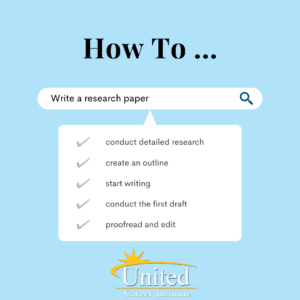You have likely written several research papers throughout your secondary and postsecondary education. However, writing a research paper can still seem like an intimidating task, regardless of the amount of experience you have. Thankfully, United Career Institute is here to cover everything that should be included in your research paper. Continue reading to learn more about what research papers are and what should go in them.
What Is A Research Paper?
 A research paper is a great tool for students, researchers, and scholars to convey information about a specific topic. Research papers make it easy to publish and share data and findings. Some research papers are even published, allowing other researchers and scholars to compare them to their work.
A research paper is a great tool for students, researchers, and scholars to convey information about a specific topic. Research papers make it easy to publish and share data and findings. Some research papers are even published, allowing other researchers and scholars to compare them to their work.
Research papers are great for learning something new and retaining new information. Because research papers are often used in higher education, it is essential to know the common structure and what information should and should not be in a research paper.
What Should You Include In A Research Paper?
As mentioned above, research papers tend to follow a similar layout. With that being said, there are times when the format can change. For example, certain paper styles, more on those styles later, may require a title page. Title pages serve as a place to put all the information about yourself, the class, and, as the name implies, the paper’s title. There are some changes that depend on the style. For example, here is a guide about what to put on an APA title page.
Introduction
The introduction section of a research paper provides essential background information on the topic. When writing a research paper, the background information should cover everything you feel is essential to someone with limited or no knowledge about the topic. Ultimately, the introduction aims to establish the paper’s purpose, create a foundation for the rest of the paper, and engage readers so that they continue reading.
Body
The body section of a research paper contains the main content of the paper. It contains an in-depth analysis of all your research and the findings from your research. The body focuses on presenting evidence and supporting your analysis. The body section will make up the majority of your paper.
Conclusion
The conclusion section of a research paper is a summary of everything you have covered in your paper. It restates the topic, states the conclusions, and can show how it applies to a broader context. It is important to remember that the conclusion emphasizes the key takeaways and reinforces the overall message but does not introduce new information.
References or Works Cited
A research paper’s references or works cited section lists all the sources used within the paper. Each reference should follow the proper style, which is the style your paper was written in. The references section is crucial for scholarly integrity, allowing the writer to reference others’ work without stealing. Also, it allows the readers to find the sources used in the paper and verify them.
Where Should You Begin Writing Your Research Paper?
The first step when writing a research paper will always be determining the topic. Depending on the class, this could be assigned to you or chosen by you. From there, the next step would be to research the topic. While researching, make sure to keep track of and save any valuable sources that you find. This makes it much easier to reference them when you begin writing your paper.
The next step is outlining the paper, but there is no specific way you need to make your outline. If something as broad as a bulleted list works for you, then make a bulleted list. If something as detailed as a rough draft works for you, then make a rough draft. Also, you can make multiple outlines, starting broad and becoming more and more specific each time. This article goes more in-depth about the various outlining methods and provides examples of them.
After you have written your first draft, you want to begin the most crucial step: proofreading. This step allows you to catch any mistakes you may have made and fix them. Proofreading also allows you to optimize your paper and make it as smooth as possible for the reader to read and understand. You will want to proofread your paper a few times before submitting it.
What Are Some Tools That Can Help You Write Your Research Paper?
United Career Institute provides students with a plethora of resources to assist them in writing research papers. In the Student Resources section of the website, students have access to the Library/Resource Center. This section includes instructions on accessing the library through Canvas. Also, it links to helpful resources such as EasyBib and the Purdue Writing Lab. EasyBib is a great resource that generates free citations for your paper in any paper style. The Purdue Writing Lab explains how to properly cite your sources and follow the other requirements of your paper’s style.
Also, you can visit the specific sites for your paper’s style: American Psychological Association (APA), Chicago Manual of Style (CMS), or Modern Language Association (MLA). Like the Purdue Writing Lab, these sites provide information about properly citing your sources and other stylistic requirements.
How Do Research Papers Help Your Education?
Research papers are used throughout secondary and postsecondary education. They allow students to complete in-depth research about a specific topic in their designated field. The information gathered to write the paper can enhance students’ education. After learning about their topic, they get the opportunity to apply their research through writing a paper. For example, students in UCI’s Clinical Medical Assistant program could write a research paper about how new technology is affecting the medical assisting practice, which would be relevant to their degree.
Do you want to continue your education? If the answer is yes, contact United Career Institute’s admissions office by Requesting Information or calling 724-515-2440 today!
